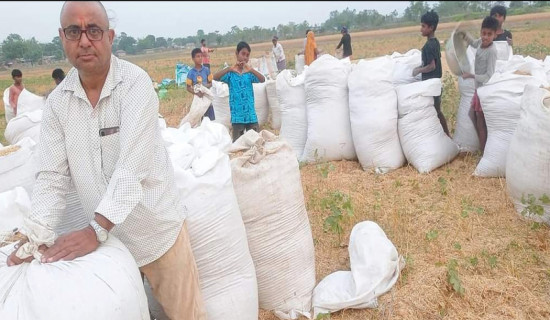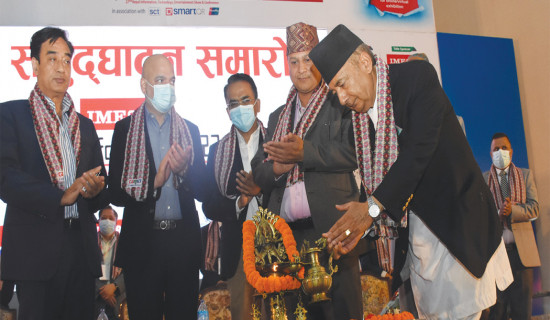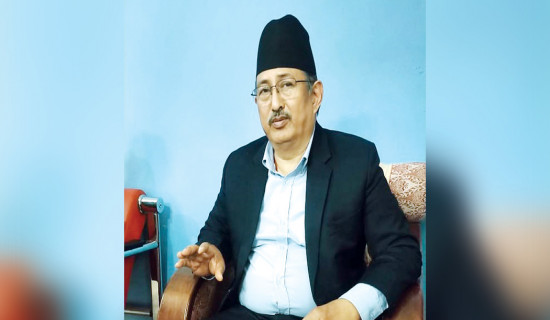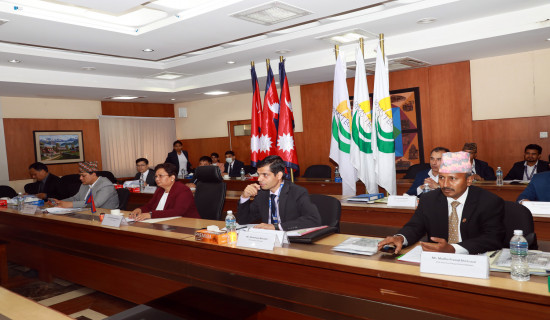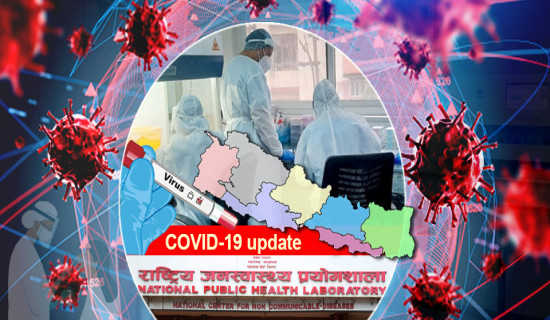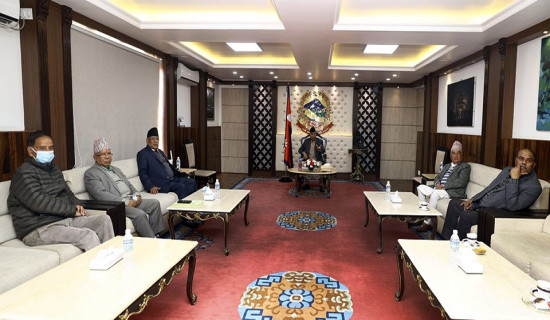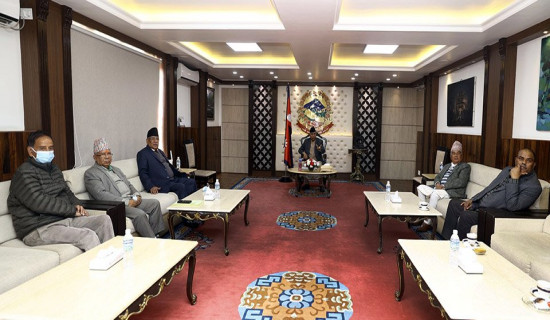- Friday, 5 September 2025
‘Days or hours left’: Russia tightens the noose in Mariupol
With the holdouts coming under punishing new bombing attacks, another attempt to evacuate civilians trapped in the pulverized port city failed because of continued fighting.
Inter reach Italian Cup final
Stefano Pioli’s men lead Inter by two points in the table, although the reigning champions have a game in hand.
Animal raisers scour fields for wheat husk
People used to come from cities in cars to buy mustard directly from the fields in February and March, but now they have started coming to get husk.
Masterchef Santosh Sah and team’s Nepal visit concludes
The Nepal chapter of the Pacific Asia Travel Association (PATA) had invited the chefs to Nepal under its campaign to revive the country’s tourism after the devastating COVID-19 pandemic.
CAN InfoTech kicks off in capital
Minister for Communication and Information Technology Gyanendra Bahadur Karki inaugurated the fair during a function.
Do not produce materials bearing election symbols: EC
The EC on Wednesday issued a statement requesting the concerned parties to stop the production, sales, and purchasing of the materials consisting of the election symbol of any political party.
NC committed to five-party alliance: Minister Khand
All doubts and questions have been ended regarding the timely conduction of the election scheduled for May 13, Minister Khand said.
Lumbini Master Plan nears completion
These are projects related to the construction of six domed structures, beautification, waste and sewage management, park and reservoir construction, and road expansion.
Stick To Poll Manifesto
With the date for local elections drawing closer, the political parties have ramped up their campaign to win the support of voters. One way to gain the confidence of the electorates is the issuance of poll manifesto that is a commitment paper of a party made to the public. The manifesto highlights the ideology, policy, programs and action plan of the party that unveils it. The party commits to implementing the promises made in the manifesto if it wins the election and holds the public offices. Theoretically, the manifestoes offer the voters informed decisions before casting their ballots. They come to know about the parties' vision and priorities meant for addressing the burning issues and problems facing the country. Moreover, a poll manifesto serves as the political document for the people to make the given party to accountable to their commitment and action on the ground. The voters accept or reject the parties in the elections on the basis of their performance based on their manifestos. Constitutionally, the parties are not obliged to make public the manifesto but they are morally bound to translate their promises into action. It is a good practice of unveiling the manifesto ahead of polls, which reflects the healthy exercise of democracy. This strengthens the democratic culture, transparency and credibility of the political parties while nurturing their bond with the people. In Nepal, the parties have continued to follow this tradition and canvassed for votes on the basis of their manifestoes. But they are criticised for making tall promises and failing to implement them after the election victory. Nonetheless, the public considers the manifestoes as the yardstick to make informed choices at the ballot boxes. The major and minor parties are set to go to the doorsteps of voters with their manifestoes for the local polls to be held on May 13.The other day, CPN-Unified Socialist, a constituent of the five-party ruling alliance, made public its 47-page election manifesto with the slogan of “People-oriented local government, basis of development and prosperity.” It has rolled out an array of ambitious programmes to bolster social welfare system and good governance as envisaged in the constitution. According to the news report of this daily, the Unified Socialist has put forward the schemes of free drinking water, free health services, reforms in the education system, the protected agricultural market for improving farmers' living standards, developing of road connectivity and other infrastructures, protecting rights of women, children, elderly people, disabled, sexual minorities, Dalits and other minority communities. The party has announced to provide every household with 5,000 liters of clean drinking water in the municipality and 200 units of electricity free of cost through the local government. It has vowed to build well-equipped libraries at the municipal level, chalk out a special plan for the protection of water resources, sort out the problems of landless squatters, create a corruption-free local government and manage the encroached public lands and properties. The party has decided to disclose the property details of its candidates on the day of their nomination for the local level election. The manifesto appears to be impressive but challenges lie in realising it. As the new party, the local poll is a litmus test for it. In order to brighten its poll prospect, it must be able to walk the talk.
Learning From Sri Lankan Crisis
The economic crisis in Sri Lanka has deteriorated rapidly. It has triggered an unprecedented outburst of resentment from the public in Colombo.
Keep Liver Healthy
Vinod C. DixitAs usual, this year’s April 19th was observed as World Liver Day to spread awareness about liver-related diseases. The liver is the second largest and the most complex organ in the body, with the exception of the brain. It is a key player in your body’s digestive system. Everything we eat or drink, including medicine, passes through the liver. It fights infections, regulates blood sugar, removes toxins, controls cholesterol, makes proteins and releases bile to help digestion. We cannot survive without the liver, and it can be easily damaged if we don’t take proper care of it. Liver diseases can be caused by Hepatitis A, B, C, alcohol, and drugs. Viral Hepatitis occurs due to consumption of contaminated food and water, unsafe sexual practices, and drug abuse. Dr. Arvind Sahni, Director, Gastroenterology, Fortis Hospital Mohali, says, “Liver cancer today is the fifth most common cancer claiming millions of lives annually.” However, recent developments in diagnosis and treatment have helped to cure many patients. Remaining vigilant and getting health check-ups done regularly can help in the early detection of liver cancer. A second factor to remember is that liver cancer occurs almost always in diseased livers. It is vital for everyone to get Hepatitis B and C screened regularly and adopt a healthy lifestyle. Alcoholic Liver Disease is a common liver disease. One may catch this ailment after consuming too much alcohol. If you overload your liver by drinking a lot of alcohol, the excess alcohol would end up circulating in your blood. This, in turn, affects our organs like the brain and heart, leading to increased intoxication. Alcohol consumption of more than four drinks (48 g) daily is associated with an increased risk of cirrhosis, liver cancer, and premature death. Alcohol-related liver injury includes acute alcoholic hepatitis, fatty infiltration and cirrhosis. There has been a steady rise in the rate of liver diseases over the years. Globally, alcohol, NASH and viral hepatitis are the most common causes of liver diseases. As per the World Health Organisation’s estimates published in 2017, liver disease deaths in India reached 259, 749 or 2.9 percent of total deaths. Many studies have suggested that sugar-sweetened beverages play a role in the epidemics of obesity, metabolic syndrome and fatty liver disease. It has been known that the fructose component in sugar directly causes abnormalities in the metabolism of sugar and lipids. Indirectly, sugar promotes positive energy balance leading to an increase in body weight and fat content which in turn causes dysregulation of lipid and carbohydrate metabolism.Vitamin A is considered toxic to the liver. Excessive iron from supplements often present in over-the-counter multivitamin preparations can cause iron to accumulate in the liver cells. Presently, there is no cure for a severely diseased liver. Therefore, it is critical to take care of this multi-functionary organ and gland. The only way to manage a failed liver is to get a liver transplant. Let us prevent liver decreases by adopting a healthy lifestyle and maintaining a healthy diet. We should eat foods from all the food groups such as grains, protein, dairy products, fruits, vegetables and fats. Besides, we need to take whole-grain bread, rice and cereals, ensuring safe blood transfusions to avoid contracting Hepatitis A, B and C. Washing hands after going to the bathroom and doing exercise regularly is also necessary for keeping our liver healthy.
Nepal insists on collective commitments for energy security
Kathmandu, Apr. 20 (RSS): Nepal has emphasized that collective commitments were necessary for energy security. During a third meeting of energy ministers from the Bay of Bengal Initiative for Multi-sectoral, Technical and Economic Cooperation (BIMSTEC) here today, Minister for Energy, Water Resources and Irrigation, Pampha Bhusal, highlighted the need for mutual trust, clarity in future endeavors and sincerity in objectives to address the serious issues in the energy sector, bearing in mind the future of 1.7 billion people of BIMSTEC nations. The meeting was assisted by video conferencing technology. Expressing her hope that the meeting would contribute to enhancing mutual energy cooperation among the BIMSTEC nations, the Minister stressed the need for adequate fiscal mobilisation and technology handover to advance toward the path of energy security. She took time to say that increasing inter-relations among the BIMSTEC member states on all fronts would help further promote the spirit and sentiments of regional cooperation. Talking about the Memorandum of Understanding (MoU) for the establishment of the 'BIMSTEC Grid Interconnection' signed at the fourth BIMSTEC Summit held in Kathmandu, the Minister said, "Energy trade is a significant issue and it is capable of addressing the problem of electricity waste and mitigating the risk of energy crisis in the region." "Energy is always the area of priority of BIMSTEC," the Minister said, explaining that relentless efforts were made to promote energy cooperation in the sector. The Minister further stressed the need for mutual cooperation, coordination and facilitation in the energy sector by encouraging the culture of experience sharing, increasing capacity enhancement and promoting best practices. Also addressing the meeting, Ministry Secretary Devendra Karki was of the view of proving the COVID-19 crisis as a take-off for a green, safe and more sustainable Bay of Bengal. " There is opportunity in every crisis." For this, a consolidated and renewable regional partnership in energy would be of importance, he asserted. -
13 new cases, 25 recoveries in last 24 hours
Kathmandu, Apr. 20 (RSS): Thirteen new cases of COVID-19 have been reported in the country in the past 24 hours. This was revealed in a total of 3,877 tests carried out in various laboratories in the country, according to the Ministry of Health and Population.During the same period, 25 more people have recovered. The recovery rate is 98.7 percent.Likewise, no casualty was reported. The death toll remains stagnant for the past few days at 11,951 so far. Also today, 138,182 people were vaccinated against COVID-19. Currently, the number of active cases of COVID-19 is 318, with 314 in home-based isolation and four in institutional isolation, four in ICU and one with the support of ventilator.
Ruling parties finalise seat sharing in metropolis, sub-metropolis for local polls
The ruling parties have finalized a deal on seat-sharing among them in the metropolis and sub-metropolis across the country.
Ruling coalition's meeting underway at Baluwar
The meeting of the ruling coalition is expected to finalise the electoral coordination for the upcoming local level elections in six metropolitan cities and 11 sub-metropolitan cities.




